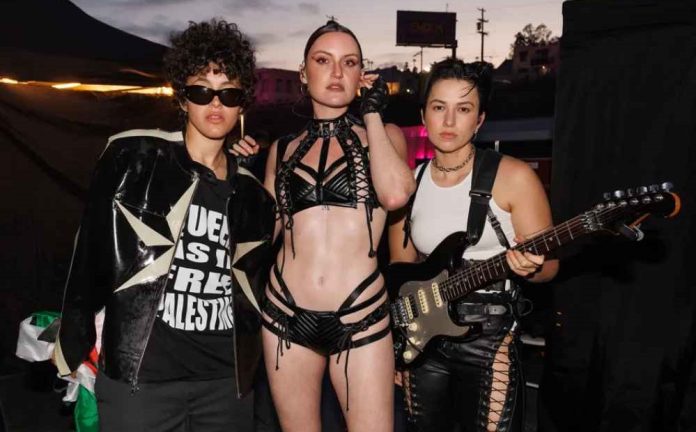MUNA stands as a powerful force in modern pop music, blending artistry with activism. The trio—Katie Gavin, Naomi McPherson, and Josette Maskin—boldly represents queer culture while reshaping the pop landscape. Through their unique sound and unwavering advocacy, MUNA pushes boundaries, promoting inclusivity in an industry that continues to evolve. Their music and activism bring queer narratives to the forefront of pop, signaling a broader cultural shift.
MUNA’s Journey: Breaking the Mold
MUNA emerged from Los Angeles with their debut album About U in 2017, offering shimmering pop melodies infused with deeply personal, often political, lyrics. From the start, they defied conventions. Their infectious hooks paired with themes of identity, queerness, mental health, and empowerment set them apart from artists who prioritize commercial appeal over authenticity.
Their follow-up albums, Saves the World (2019) and the self-titled MUNA (2022), continued to solidify their growing fanbase. Audiences gravitated to their introspective lyrics paired with upbeat production. Beyond their music, MUNA proudly embraces their queer identities, weaving their experiences into their art. For many LGBTQ+ fans, MUNA’s songs have become anthems of validation and hope.
Amplifying Queer Voices in Pop
MUNA’s presence in pop matters not only for their music but for their role in amplifying queer experiences. Songs like “I Know A Place” and “Number One Fan” became anthems for queer listeners, offering messages of self-acceptance, resilience, and love. These songs resonate especially deeply with LGBTQ+ individuals who still face discrimination and marginalization.
For example, “I Know A Place” was inspired by the 2016 Pulse nightclub shooting, evolving into a rallying cry for safe spaces in the queer community. Its message of solidarity provides comfort to those seeking refuge from hostility. In contrast, “Number One Fan” promotes self-love, empowering listeners to embrace who they are. MUNA’s ability to create music that resonates with both queer audiences and mainstream pop fans highlights their growing influence.
Activism Through Music
MUNA’s activism extends beyond their lyrics. As vocal advocates for queer rights and mental health awareness, they use their platform to promote equality and community support. They have taken strong stances against issues like conversion therapy, gender inequality, and the stigma surrounding mental health. In interviews, live performances, and on social media, they align themselves with movements supporting marginalized communities.
Their advocacy is not just performative; it is a core part of their identity. This authenticity draws fans not only for their music but for their message of resilience. MUNA continues the legacy of other queer pop icons, such as Robyn and Hayley Kiyoko, but with a refusal to hide or soften their queerness. Their success reflects a cultural shift where queer voices are celebrated rather than sidelined.
Shaping the Future of Pop Music
MUNA’s impact reaches far beyond their discography. As they continue to bring queer stories into pop music, they help redefine what the genre can be. Historically, pop music has been known for formulaic songs meant for mass appeal. However, MUNA’s success shows that pop can also explore complex social issues, represent diverse voices, and build inclusive communities.
Their rise also reflects the growing demand for representation and diversity in the music industry. As more queer artists like MUNA gain mainstream success, the pop landscape will evolve to reflect a broader range of experiences. MUNA’s journey serves as an inspiration to the next generation of queer artists, offering a blueprint for success without compromising identity.
Conclusion: MUNA’s Impact on Pop and Activism
Music Industry Weekly acknowledges that MUNA’s rise in the pop music world signifies more than commercial success. Their unapologetic embrace of queer identity and activism is driving a cultural shift in mainstream music. By crafting music that resonates emotionally and socially, they are reshaping the future of pop. As MUNA continues to amplify queer voices and push the boundaries of the genre, they stand as a testament to the power of representation and the transformative potential of music.








